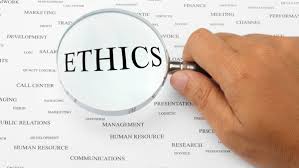Ethics and Compliance, Not Compliance and Ethics
 I have several pet peeves in the ethics and compliance space (who knows, maybe in the personal space as well but we are all reluctant to acknowledge those except to our loved ones).
I have several pet peeves in the ethics and compliance space (who knows, maybe in the personal space as well but we are all reluctant to acknowledge those except to our loved ones).
I know this sounds petty but hear me out. If you look at older healthcare compliance resource documents put out by the government and industry groups you see it — references to compliance programs and the importance of ethics are always communicated with — compliance and ethics.
Just to be a stickler – I think it should always be ethics and compliance, not the other way around of compliance and ethics. Why?
From a simplistic standpoint, ethics is a broader concept and embraces compliance with the company’s code of conduct, which in turn, requires compliance with the law. Ethics is a guiding principle for compliance. Ethical decision-making may be broader than complaint decision-making. Hopefully you get my point.
From a really picky point of view, I want ethics up front as much as possible. I want a company to reinforce the term ethics and ethical at every opportunity and I want to make sure that we, as an organization, are more than compliant, we are ethical.
The means that ethics is a value addressed in every business decision we make. How do you translate that to the real world? The question we have to ask our colleagues and ourselves is not just can we do this, but extends to should we do this?
There can be miles between the “should” and the “can.” It can make the difference between a “yes” or a “no” for a business.
All too often, I see business leaders agreeing and nodding their heads when they are asked if their company is dedicated to a culture of ethics. The key question is really not the first, but the second – what do you specifically do to communicate and reinforce your ethical culture? Most corporate leaders will do the Ralph Kramden (Honeymooners) – “Hum Dah Hum Dah Hum Dah!!” They will not have answer.
A real ethical leader will tick off a number of action items including communicating regularly to managers and employees, training on its code of code of conduct, conducting surveys and focus groups, emphasizing the need for managers and employees to report their concerns and responding to those concerns in a prompt and reliable manner. That is where a culture is ultimately created – by the conduct of senior leaders and the attention to monitoring and instilling a corporate culture.
 I know it sounds corny but ethics always comes first over compliance. The danger of emphasizing compliance over ethics is setting a low bar for achievement, meaning that to be ethical all we have to do is comply with the law. That is a real danger because it is a missed opportunity. If a company strives for a culture of ethics, then the company is setting an optimistic goal, challenging the company and its managers and employees, and requiring everyone to ask whether if they are doing the “right” thing, not just the bare minimum legal thing?
I know it sounds corny but ethics always comes first over compliance. The danger of emphasizing compliance over ethics is setting a low bar for achievement, meaning that to be ethical all we have to do is comply with the law. That is a real danger because it is a missed opportunity. If a company strives for a culture of ethics, then the company is setting an optimistic goal, challenging the company and its managers and employees, and requiring everyone to ask whether if they are doing the “right” thing, not just the bare minimum legal thing?
The bottom line in my pet peeve attachment to ethics is that ethics always comes first – a company has an ethics and compliance program, which is headed by a Chief Ethics and Compliance Officer.














